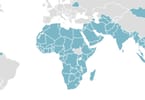(eTN) – On September 22-23, the UN World Tourism Organization (UNWTO) held its first ever conference in Australia. The conference, entitled the Review Meeting on the Integration of Tourism and Emergency Management, was the first conference in the world in which leaders of emergency management service providers and policy makers, as well as tourism industry and government leaders (from all sectors of the industry) came together to discuss practical ways and means of working effectively to cooperate in the event of natural disasters and other crisis events.
The conference was organized by The Risk and Crisis Unit of the UNWTO and the author, with the active cooperation and support of the Australian Emergency Management Institute, Bournemouth University (UK) Centre for Disaster Management, and the Tourism Division of the Australian Department of Resources Energy and Tourism. The venue was the HQ of the Australian Emergency Management Institute HQ at Mt. Macedon, 65 kilometers from Melbourne.
The 36 participants included leaders from all sectors of the Australian travel industry in addition to delegates and speakers from New Zealand, Malaysia, Japan, and the UK, along with the host, Dr. Dirk Glaesser, Manager of the Risk and Crisis Unit, UNWTO (Madrid). There was a very strong representation of emergency management specialists, including officials from the Australian Emergency Management Institute, Kenyon (the world’s largest private sector emergency management company), Sydney Water, and the Surf Life Saving Association of Australia, as well as some of Australia’s leading tourism risk and crisis management academics.
The meeting examined the management of a range of recent crisis events which impacted on tourism including the 2011 Queensland floods and the 2009 Victorian Bushfires in Australia, which were discussed by Daniel Gschwind of the Queensland Tourism industry Council; and Paul Albone and Stuart Toplis from Tourism Victoria; and Ross Clapcott, who is the Chief Advisor (tourism )to New Zealand prime minister John Key, who briefed the meeting on the impact and responses to the Christchurch earthquake of February 2011. Masato Takamatsu, CEO of Japan Marketing Co., briefed the delegates on the preparedness to response of the Japanese tourism industry to the March 2011 earthquake and tsunami. Ms. Paula Ganly, Assistant Secretary, Consular Branch of the Australian Department of Foreign Affairs and Trade, briefed the meeting about the high level of cooperation which existed between Egyptian emergency management services and tourism operators in assisting foreign travelers impacted by the Egyptian uprising in early 2011. Ms. Ganly headed all Australian government operations to assist Australian citizens affected by the Egyptian uprising and was based in Cairo during the height of the uprising. Laurie Ratz from the Insurance Council of Australia explained the insurance dimension in risk, crisis, and emergency management.
The centerpiece of the conference involved the presentations by Richard Gordon, Director of the Bournemouth University Centre for Disaster Management, and Dr. Dirk Glaesser on the UNWTO. Mr. Gordon outlined the research being conducted by his organization, which was commissioned by the UNWTO to explore an ideal model of integration between all sectors of the tourism industry, emergency management authorities, and service providers around the world. Gordon stated that there needs to be a mutual benefit for tourism and emergency management organizations to work together as is already the case with airlines , airport, and cruise operators. He pointed out that many tourism professionals and emergency management professionals and organizations need to overcome a silo mentality. Dr. Glaesser pointed out that the UNWTO is strongly committed to dealing with integration on a global level, and tourism and tourists were frequently victims of crisis events but also had great potential to be part of the solution. This view was supported by Kym Duggan, First Assistant Secretary, National Security Capability Development Division, Attorney General’s Department (Australia).
One of the immediate outcomes of the conference was an agreement between the Australian Attorney General’s Department and the Tourism Division of the Australian Ministry of Resources, Energy and Tourism to advance their level of cooperation to include tourism and an integral element of national resilience and disaster planning, and the two ministries agreed to suggest this approach to other governments in international fora.
Dr. David Beirman, the author of this article, organized this conference with the UNWTO in his capacity as a Senior Lecturer in Tourism at the University of Technology-Sydney. More details of this event may be found at http://www.unwto.org .
WHAT TO TAKE AWAY FROM THIS ARTICLE:
- The conference, entitled the Review Meeting on the Integration of Tourism and Emergency Management, was the first conference in the world in which leaders of emergency management service providers and policy makers, as well as tourism industry and government leaders (from all sectors of the industry) came together to discuss practical ways and means of working effectively to cooperate in the event of natural disasters and other crisis events.
- One of the immediate outcomes of the conference was an agreement between the Australian Attorney General's Department and the Tourism Division of the Australian Ministry of Resources, Energy and Tourism to advance their level of cooperation to include tourism and an integral element of national resilience and disaster planning, and the two ministries agreed to suggest this approach to other governments in international fora.
- The conference was organized by The Risk and Crisis Unit of the UNWTO and the author, with the active cooperation and support of the Australian Emergency Management Institute, Bournemouth University (UK) Centre for Disaster Management, and the Tourism Division of the Australian Department of Resources Energy and Tourism.






















